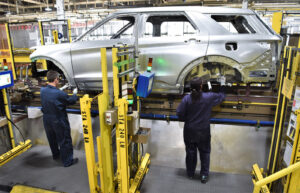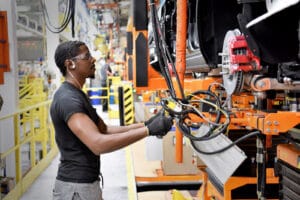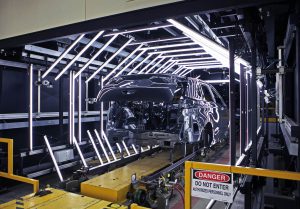
Struggling to cope with increasing shortages of critical microchips, Ford Motor Co. plans to idle two of three shifts at an assembly plant in Chicago next week, while a local union leader warned employees the closure could be extended.
The chip shortage is impacting a growing number of automakers and leading industry analysts to warn that the problem could slow the industry’s recovery from the coronavirus pandemic. At this point, carmakers who have had to trim production due to the shortages include Stellantis, Toyota, Volkswagen, Honda, Mercedes-Benz, Audi, Subaru and Nissan.
Officials from the new Biden administration have scheduled a meeting with their counterparts in Taiwan, according to the White House, and are expected to ask for help pressuring the world’s largest automotive chip supplier, Taiwan Semiconductor Manufacturing Co., to ramp up operations.
(Despite production cuts due to chip shortages vehicle inventory remains stable.)

“We are grateful for the Biden administration’s ongoing assistance and hope it can continue as more key positions are filled,” Matt Blunt, president of the lobbying group, the American Automotive Policy Council, said in a statement. “We continue to engage with government officials as this remains a critical issue.”
Today’s automobiles are essentially computers on wheels, using scores, even hundreds, of microprocessors and other chips to regulate their powertrains, control infotainment systems and operate the latest digital safety systems.
But the demand for microchips has overwhelmed the supply in recent months. Experts point to a variety of factors but one key reason was the unexpectedly quick rebound of automotive manufacturing after pandemic-related shutdowns last spring. Complicating matters, many suppliers have redirected chips for use by personal electronics manufacturers who have seen a surge in demand as millions of Americans – and others abroad – have struggled to cope with COVID lockdowns by working and shopping at home.
The impact has varied from one automaker to another. So far, General Motors has been able to avoid having to close plants or slow production lines. But its crosstown rival Ford has been especially hard hit.
It now plans to idle the second and third shifts at its big Chicago Assembly Plant which assembles two key models: the Ford Explorer and Lincoln Aviator. The closure is scheduled to last for a week but, in a letter sent to workers, local union leader Coby Millender said that he has been advised there is “a strong potential for additional weeks” of closure if Ford can’t come up with more chips quickly.

The exact number of workers who will be impacted isn’t yet clear, said Ford spokesperson Kelli Felker, though the facility currently employs 5,300 hourly workers and hundreds more on salary.
Ford has, meanwhile, extended the chip-related shutdown of another light truck plant in Louisville, Kentucky, as well as one in Oakville, Ontario, said Felker, adding that hourly workers will continue to receive as much as 75% of their gross pay while off the job.
(Nissan, Honda slash production due to chip shortages as GM, Daimler, others warn of similar moves.)
Asked if other cuts might follow, Felker said, “It is a really fluid situation and I couldn’t predict what’s ahead for us.” A separate company statement said Ford is “(w)orking closely with suppliers” to resolve shortages.
Stellantis – formed earlier this month through the merger of Fiat Chrysler Automobiles and France’s PSA Group – is looking for ways to reopen plants in both Mexico and Canada producing vehicles for the Chrysler, Dodge and Jeep brands.
How long the crisis could persist is uncertain, though a ranking official within the Chinese auto industry warned it could take as long as a decade to resolve. “China’s chip industry is under tremendous pressure,” Yuan Chengyin, who oversees the country’s push into electrification, said an interview with Bloomberg News. “I don’t think the issue can be solved overnight.”

A number of industry analysts in the U.S. and abroad have begun looking at how much of an impact the shortage will have on automotive production. Any delays could complicate the industry’s recovery from the pandemic at a time when manufacturers have been struggling to rebuild vehicle inventories hurt by COVID-related factory closures.
Even before the shortages started to be felt, the official forecast by Cox Automotive called for 2021 U.S. sales to climb back only to around 15.7 million compared to the 17.1 million vehicles sold in 2019.
A report by Bloomberg estimated that Detroit automakers alone could lose as much as $61 billion in revenue this year if the chip shortage continues.
Responding to the mounting concerns, Biden trade officials will meet with their counterparts next week in Taiwan – a country that has become one of the primary suppliers of the microchips used in automobiles. In particular, the White House wants help pressuring Taiwan Semiconductor (TSMC) to increase production. Representatives from that firm and other Taiwanese chip suppliers also are expected to attend.
Ahead of the meeting, TSMC said that, “While our capacity is fully utilized with demand from every sector, TSMC is reallocating our wafer capacity to support the worldwide automotive industry.”
(Pandemic acts as catalyst for additional change in auto industry, analysts suggest.)
The crisis has hit the auto industry especially hard but other chip users are worrying about supply shortages, as well. Korea’s Samsung Electronics this week said it is closely watching the implications” of the shortages, warning that it “could affect mobile demand,” as well.







